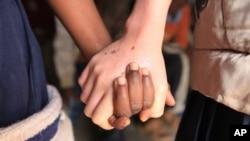Police said the death of 21-year-old Ian Muhama in the Kachere area of Blantyre brings the number of albino attacks this year to four — a drop from past years, but still disconcerting.
Three victims, including Muhama, have been killed, while another, a baby girl, is missing.
James Kadadzera is a spokesperson for the Malawi Police Service.
“The first incident this year in Mangochi (district), the suspects were arrested and the body was also found," Kadadzera said. "Another incident in Chikwawa [district] where a 20-month-old baby was abducted, we are on ground and we are sure of finding the suspected and we are sure of finding the whereabouts of the abducted baby.”
Kadadzera also said police are investigating the death of Muhama.
Statistics show that since 2014, more than 170 albinos have been attacked in Malawi because of false beliefs that concoctions mixed with their body parts bring luck and wealth.
In some cases, grave robbers have exhumed corpses to retrieve albinos’ bodies.
Observers say efforts to end the attacks haven’t helped much.
In 2018 the government and the United Nations developed the National Action Plan on Persons with Albinism. The plan is designed to discourage attacks and provide albinos with greater protection, in part by giving out security alarms.
Maria Jose Torres is the U.N. national coordinator in Malawi. She said full implementation of the plan could help end the attacks.
“The United Nations is calling upon the authorities to continue implementing that National Action Plan on Persons with Albinism to ensure that the criminal practice of attacking persons with albinism is fully eliminated in Malawi,” Torres said.
Boniface Massa is chairperson for the Disability and Elderly Rights Directorate at the Malawi Human Rights Commission, a key stakeholder in the action plans.
Massa said the plan, for its promises, is falling short.
“We have so far highlighted serious gaps in terms of the actual protection pillar under the National Action Plan," Massa said. "So overall what we noted from our findings that we are still analyzing is that there hasn’t been direct impact on the life of people with albinism.”
In a statement this week, Amnesty International said the recent attack is the “latest reminder that Malawi remains a dangerous place for persons with albinism.”
Some rights activists believe the attacks could end only if police mount a crackdown on markets for the albino body parts.
But police spokesperson Kadadzera says there is no such market.
“There are a lot of people that we have arrested with bones," Kadadzera said. "And they don’t have anywhere to sell the bones so that’s why I am saying this is just a mystery; this is just a belief that is unfounded.”
He said in the meantime, police, chiefs and religious leaders are trying to educate people to stop believing in the myths that perpetuate the attacks.




